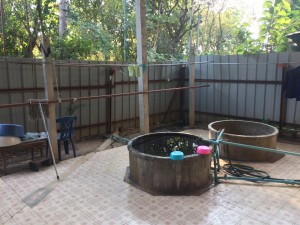I stayed in an Asoke Monday night, and I learned a lot.
I
It all started Friday afternoon. My Ajaans (teachers) mentioned a community called an Asoke that wanted to host students while we studied a dam near the community. Thais, they explained, view Asokes the way most Americans view the Amish community. And there are lots of parallels; Buddhist living in the Asoke all live together for free, working for the good of the community and sharing everything, are self-sustaining and forbid sexual misconduct, alcohol, drugs, stealing and killing. Placing us in an Asoke, my Ajaans said, would be the equivalent of having a foreign exchange student in America and placing them in an Amish community for the night. You just wouldn’t do that; they don’t have the tools or understanding to succeed in such an environment.
I
Flash forward to Monday afternoon. Unknowing to my Ajaans, the Asoke was slated to house 3 CIEE students, yours truly included. We arrived at the compound and, greeted by stares from the community, my two program mates and I met our guide. I never got her name, so I will refer to her as “Shadow” because she followed us everywhere, asking questions in English about how we were doing and could we please do ….? Well, she and the silent monk who followed us with a video camera, filming us while narrating in Thai for unknown purposes.
I
Shadow and my Ajaans talked for a bit in rapid Thai, and the ground rules were translated. This was a vegetarian community. We would not pay for our stay (CIEE normally compensates for food); working for the good of the compound would be our way of paying for the meals they fed us. We would teach English to the children in addition to cooking and cleaning. We would get up at four in the morning to pray. We would dress conservatively (no elbows, collar bones or knees showing). We agreed, smiles plastered on our faces. The Ajaans left, half laughing, half looking apologetic. And then my stay began.
I
We deposited our backpacks in an open air loft area where we, our students, and the older women slept. After a dinner of vegetables and rice, Shadow guided us to the classroom area and, greeted by 8 students, age 12-15, we were told to teach English. After a lot of bumbling along trying to figure out their English ability, we settled on teaching the names of body parts then singing “head shoulders knees and toes” and playing “Simon Says”.
I
After watching us teach for an hour, Shadow took us to the shower.

The shower area.
Those large tanks water are full of off-color rain water, and you use the pink or blue buckets to dump water on yourself to shower. And while I have bucket-showered before, it has always been in the privacy of the bathroom. So I tried, and failed, to use my patoom (a long piece of fabric you tie around yourself to shower in for modesty in such settings) and dumped some questionable looking water on myself to shower. The good news was the monk did not film me in this setting, or in the sleeping area.
I
After showering, we grabbed a few blankets and lay down on the hard floor with a thin straw mat. I maybe slept for three hours that night. It was freezing cold, the ground and pillow were hard wood and the old women nearby kept hacking and snoring.

The sleeping area. (Some mosquito nets are already put away by the students).
Shadow collected us at 4:10am to pray. We knelt and bowed to the monk who I now believed had the video camera permanently attached to his hand. After some prayers and chanting, the monk started asking questions, with Shadow as a translator, about who taught us to be good people if we weren’t religious? Why do we do good things? Do we do good things? How can we have morals without religion? Finally one of my program mates said she wanted to open a free school for girls, and the compound dwellers visibly relaxed, assured that goodness does exist in the world.
I
After our hour of interrogation and two hours of peeling garlic and shucking beans (still being followed and filmed by the monk), we were allowed to eat breakfast, then start cleaning dishes. The compound held 30 people, and Thai culture has at least three dishes plus sticky rice per meal. This makes for a lot of dishes, and we did not finish before we had to go to school. But that was all right, Shadow told us. We could make up for this by teaching English that night.
My time in the Asoke served as a wake-up call for me where I realized I still have so much to learn. I was thrown into a community I knew absolutely nothing about, and I did my best to learn as much as I could in the short time I was there. And I did learn a lot; about how to interact with people with incredibly different world views from myself, how to smile cheerfully to maintain my “Buddhist temperament” at 4 in the morning after 3 hours of sleep, and how to intentionally engage with and understand complex ideas and world views while operating in a stressful environment, while feeling the pressure of representing America to the compound dwellers. It was an incredible, once-in-a-lifetime experience and while I do not want to return, I certainly appreciate the time I spontaneously and adventurously spent in an Asoke outside a small village in rural Northeast Thailand.

